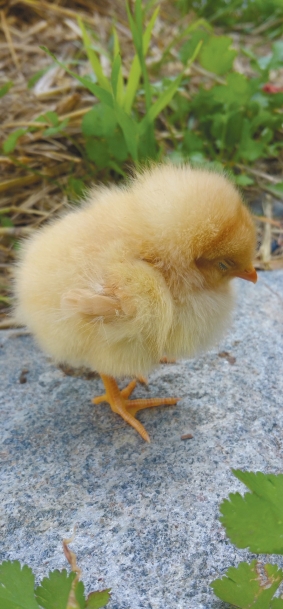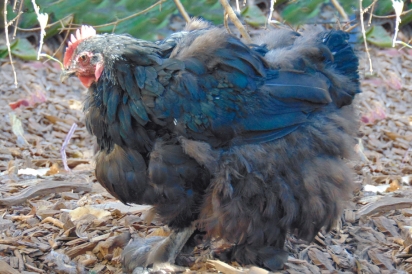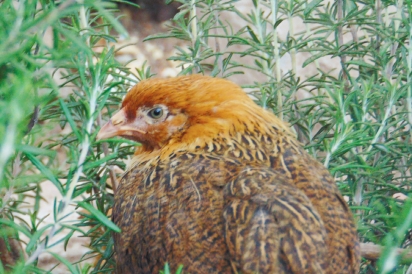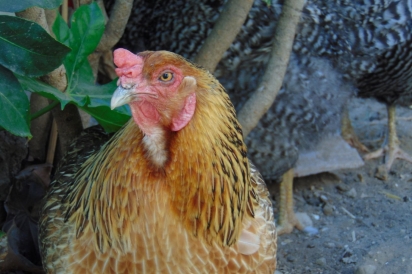Pandemic Poultry 101
An Emergency Crash Course in Backyard Chickens
So you panic-bought chickens. During the Great Egg Crisis of March 2020, these ovoid essentials were next to impossible to find in stores, so you went right to the source: the chicken. Maybe you thought it would be fun, or maybe a great responsibility for the kids, but it’s very likely that they’re now an invaluable addition to the household that you can’t imagine life without.
Depending on how old your chicks were when you got them, you might have had a long few weeks, or even months, of waiting before you got your first egg. Chickens typically start laying when they are 5 to 7 months old. During this period of waiting, you might have seen your chickens exhibiting several strange behaviors, some of which may seem concerning, especially for first-time chicken owners.
WHAT NOT TO WORRY ABOUT
Dust bathing is probably the easiest behavior to identify. Is your chicken lying on its side, rolling around in the dirt, kicking up dust and just making a general mess? Chances are that it is dust bathing. Aside from being a way for them to control parasites, the flapping also helps to regulate the natural oils in their feathers. It’s a pretty common thing for them to do, and they enjoy it!
Another behavior you may see is one of your birds lying on its side, with its wing outstretched and its eyes closed. This is called sunbathing, and it’s a common sight in all temperatures. During the summer it’s a way to control parasites, and during the winter it doubles as a low-energy way to keep warm. It doesn’t mean your bird has broken a leg or is mortally injured, but if you really need to check? Throw out a treat! They’ll be up and chasing that tasty morsel before you know it.
If you handle your hens a lot, they may freeze with their wings out a bit when you chase them. (Doesn’t everyone chase their chickens?) This is a submissive pose, something they would show to a rooster when he mates with them. Even if there is a rooster in the flock, the hens still may submit to you.
The chicken hierarchy (commonly referred to as the pecking order) is kept through subjugation, so a bit of pecking is nothing to worry about! Occasionally, the pecking will go overboard and there will be bare patches on the neck and back of one of the lower-tiered fowl. Your best course of action would be to make a cloth saddle for the bird, unless it is happening to all the birds in the yard. Then, it is suggested that you isolate the bully with no contact with the other members of the flock for up to a week. When it comes time to reintegrate, make sure you watch over them carefully so they do not injure each other too much.
Pecking isn’t the only cause of a bare back. During fall, you may come upon what looks like a chicken crime scene in your yard. Don’t worry! This is molting, a natural thing that chickens do when they shed their feathers and new ones grow in, like a dog shedding its fur. It does hurt them when the pinfeathers are growing in and they will be much more touchy about … well, touching.
WHEN TO WORRY
Predator Call: You may have heard the classic cry of a hen after she’s laid an egg. You may not have heard the cry of a hen or roo that has spotted a hawk or other predator overhead or nearby, calling the rest of the flock to attention and/or into hiding. There is occasionally a false alarm, so if you hear it and don’t have hawk netting or similar protection from aerial attacks, just go outside. Sometimes you can identify the threat, and your presence will be enough to make the culprit rethink its entire day.
Isolation: There may be a time when you see a member of your flock isolating itself. There are many causes for this behavior. One of the easiest ways to diagnose the affliction, or at least know what to search for, is to bring the bird in for observation and run through a quick list of things to note. Make sure the bird is eating and drinking well, check the vent area for mites and flies, make sure the crop is emptying properly, see that the droppings don’t have worms and that the bird doesn’t have any open sores on its body.
It’s easy to get caught up in the joy of your new pets and forget that chicken maintenance is very different from owning a cat or dog. That doesn’t mean they don’t appreciate some special attention, though!
HELPFUL CHICKEN TRIVIA
Chickens are omnivores. They don’t just like to eat grains, they like (and need!) bugs and worms as well. They have even been known to eat mice or lizards. Try treating them with a crumb of cheese or a scrap of meat!
Chickens can be trained! The things they can learn include tricks as simple as coming when you call, or as complex as identifying shapes.
The feathers around the vent area can get caked with poop and cause problems for the bird, such as fly-strike. Keep it clean!
Eggs are seasonal! You’ll get far fewer eggs during the winter. Some farmers maximize their egg output by lighting up the coop at night, but this can stress out the birds and shortens their lifespan.
Unfertilized eggs are vegan! There is no chance of them developing into a chick and if they don’t get eaten, they will literally rot away.
Chickens can live as long as dogs! While they typically only live five to seven years, the Guinness Book of World Records has the oldest chicken at 16 years old. However, anecdotal stories of 20+ year-old birds exist. Our own oldest bird is approaching 10 years old this year.








